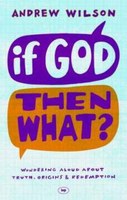If God, then what?
Dave Evans | August 2016 - Highfields Book of the Month
By Andrew Wilson - (2012) Nottingham: Inter Varsity Press
 Over the years I have dutifully tried reading books on apologetics but, not being a scientist or a philosopher, I’ve found most of them hard going.
Over the years I have dutifully tried reading books on apologetics but, not being a scientist or a philosopher, I’ve found most of them hard going.
manages to bring the big questions we have and the answers we seek down to earth
The author of this book, Andrew Wilson is a writer and pastor based in Eastbourne. He regularly contributes to the “Think Theology” website. He is someone who manages to bring the big questions we have and the answers we seek down to earth, away from the philosophers and back to where we really are. This is a different book on apologetics, written in a conversational style with amusing anecdotes from his own experience. It’s a book you could confidently give to anyone looking for the answers to life’s big questions but who has not yet committed to looking for them in the Christian faith.
After looking at how we come to believe things, i.e. the evidence, he then examines how did we get here, what’s wrong with the world and what’s the solution. He ends with “If God, then what?”
a different book on apologetics, written in a conversational style with amusing anecdotes from his own experience
This is a sample of his style and approach: “You can get into trouble for asking questions. I guess the question that got Anthony Flew into trouble with his fellow atheists, in a nutshell, was: ‘How did we get here?’ Lots of people are happy these days to say, ‘Stop asking that; we just did. The universe is just here. Lump it.’ But that’s why questions have such power. As soon as you ask what the options are – luck, multiverse or creator (or the last two together) – and have to start deciding between them, you realize what Anthony Flew realized. The scientific evidence for a creator may well be stronger than you thought.”
lots of stories and dialogue, cleverly but gently exposing the shallow thinking of many who dismiss the Christian message
He is equally perceptive when talking about what is wrong with the world: “If you’ve been cheated on, you’ll know that forgiveness isn’t easy. In effect, it involves taking upon yourself all the pain and evil the other person committed against you, and absorbing it. Personal betrayals don’t just disappear into the ether. The pain has to be borne by someone – either by the betrayer or the one betrayed.”
“I find people are sometimes surprised that God would need to do something like this, wondering why he can’t ‘just forgive’. But from where I’m standing, the very nature of forgiveness is that you bear the full force of someone else's evil upon yourself, and in doing so find a way to set them free from what they’ve done to you. So if we were to be made right with our Creator, we would need him to find a way of taking our sins upon himself, and reconciling us to him through it, forgiving us en masse for all the things we’d done wrong.”
There are lots of stories and dialogue, cleverly but gently exposing the shallow thinking of many who dismiss the Christian message. So if you like humour and apologetics, together with deceptively sharp thinking, try this. Then give it away to someone.
Document Actions

